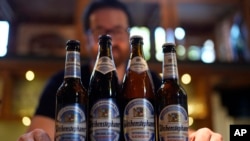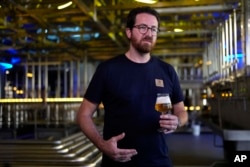The head brewmaster for Weihenstephan, the world’s oldest brewery, has a secret.
The secret is that he really likes to drink alcohol-free beer.
Tobias Zollo is quick to say that he enjoys real beer more. Still, the expert brewer says he enjoys alcohol-free beer when he is working.
Alcohol-free beer has the same taste as usual beer but has fewer calories, he said.
The caloric reduction is a result of the brewery’s process of evaporating the alcohol.
“You can’t drink beer every day — unfortunately,” he joked recently at the Bavarian state brewery in the German town of Freising, located about 31 kilometers north of Munich.
Zollo is not alone in his enjoyment for alcohol-free beer. The drink has been gaining popularity in recent years as interest in the alcoholic version decreases.
Christian monks established Weihenstephan as a brewery in 1040. The operation began to produce non-alcoholic wheat beer and lager in the 1990s. Now those non-alcoholic drinks account for 10 percent of its total beer production. The same is true, generally, across Germany’s beer industry.
“The people are unfortunately — I have to say that as a brewer — unfortunately drinking less beer,” Zollo said recently. He spoke the day before the start of Oktoberfest, a 16-day celebration held yearly in Munich.
Zollo said that if there is a way to offer a choice that has “the crisp and fresh taste from a typical Weihenstephan beer, but just as a non-alcoholic version, we want to do that.”
Celebrants can choose that version at all but two of the 18 large tents at the event. The alcohol-free beer will cost the same as an alcoholic beer.
Oktoberfest celebrant Mikael Caselitz of Munich seemed to approve of the drink choices.
“For people who don’t like to drink alcohol and want to enjoy the Oktoberfest as well, I think it’s a good option,” he said.
The 24-year-old continued, “Sometimes people feel like they have more fun with alcohol, which is not a good thing because you can also have fun without alcohol...If you want to come and drink alcohol-free beer, nobody will judge you.”
Oktoberfest began in the early 1800s.
This year marked the first time an alcohol-free beer garden opened in Munich. “Die Null,” which means “the zero” in German, served non-alcoholic beer and other alcohol-free drinks near the city’s main train station this summer.
Walter König is managing director of the Society of Hop Research. He said researchers have had to create special hops for alcohol-free beer. If brewers use the usual hops for alcohol-free beer, the special smell gets lost when the alcohol is reduced during the brewing process.
But alcohol-free beer buyers do not care about that, König said recently as he prepared for Oktoberfest. He explained, “They only want to know that what they are tasting is as good as traditional beers with alcohol."
I'm John Russell.
Stefanie Dazio reported on this story for the Associated Press. John Russell adapted it for VOA Learning English.
__________________________________________
Words in This Story
brewery -- n. a place where beer is produced
monk -- n. a man who is a member of a religious order and lives in a monastery
crisp -- adj. notably sharp and clear
typical -- adj. having the essential characteristics of a group
option -- n. something that may be chosen
hops -- n. the dried flower clusters of the hemp family used especially to give a bitter flavor to beer







Forum